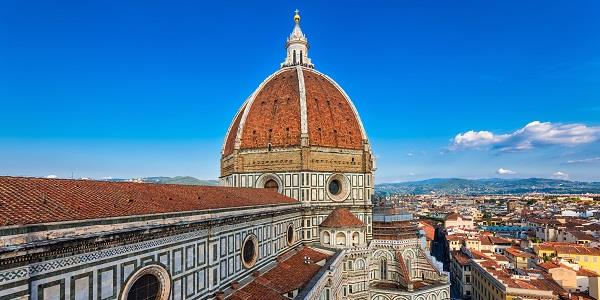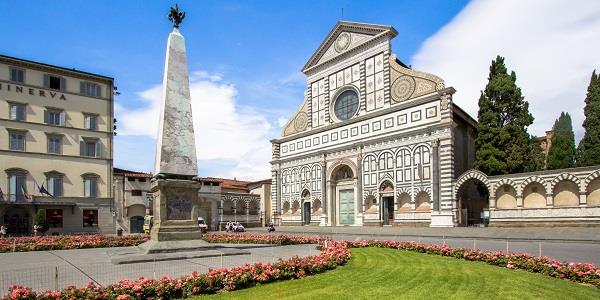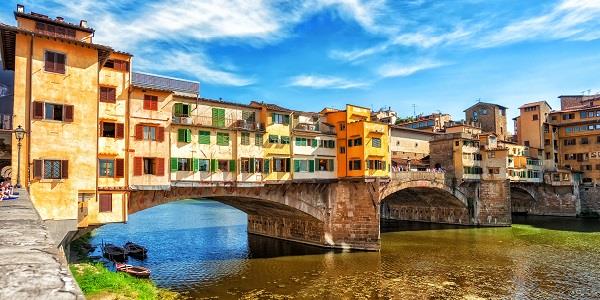
Stigliano, an ancient Tuscan palazzo-turned-top-class holiday accommodation, lies 20 minutes’ drive to the south of Siena. Indeed, that glorious medieval hilltop city just 20-odd kms distant is easily visible from the holiday site.
About 70 kms further north, Florence awaits your pleasure. The birthplace of the Italian Renaissance, the capital of Tuscany and without question a jewel in the region’s – actually Italy’s – crown.
Whether you favour one city over the other depends on personal preferences. But both are must-sees; both can be visited in a day (though not the same day!); and both are at their best in spring and autumn, when the tourist crowds have at least partly dispersed.
If you absolutely had to choose though – if time pressure was such that you could only visit one – I think you’d have to opt for Florence.
First things first: you can drive to Florence, if you wish. It’s easy enough, a journey of an hour or so along good roads, with your destination – Firenze – clearly marked.
But really, why would you want to? Much better to take the train from Siena. (See details below)
If you leave Stigliano after breakfast and aim to be back early evening, once you’ve factored in the journey times and everything you’ll be in Florence for about 6½ hours. Enough time to see it all? No, certainly not – you could be there a week and still not do justice to this acme of art and culture. But enough, I’d argue, to get a feel for the place and realise just why Florence is so special.
Size is on your side, too: Florence is small in any event, and the city’s historically important sites are conveniently concentrated in a small part of it, almost all to the north of the mighty Arno river (a useful navigational aid in itself, much as the Thames is in London).
From the station, head south past the Basilica di Santa Maria Novella – an impressive place of worship but, as you’ll soon discover, one of many – to the Piazza of the same name, a nice open space planted with rose bushes and bordered by high-end shops, bars and hotels. It is immediately apparent that Florence is a sophisticated city.

The Basilica and Piazza di Santa Maria Novella
Crossing the Piazza, continue south on the Via de Fossi – one of Florence’s myriad atmospheric narrow streets, lined with interesting shops. Yes, what they sell is aimed at tourists; but looking costs nothing, and there are bargains and curios to be had. High fashion, too.

The River Arno, looking west
Soon enough you’ll reach the Piazza Goldoni and, just beyond it, the majestic River Arno. Loiter here, if time allows, and look west towards the Ponte Vecchio. To my mind, this view gives you an inkling of what Florence is all about: beautifully appointed hotels, apartment blocks and restaurants, looking out from opposite banks of a serene waterway that’s been carving out this channel for millennia. And, in the distance, the higgledy-piggledy chaos of the city’s oldest bridge.

The Ponte Vecchio
The Ponte Vecchio spans the Arno at its narrowest point – narrowest in Florence, anyway – and these days is home to a goldrush of very up-market jewellers. From dawn till dusk it is thronged with people – buying, or more likely gawping, at the gewgaws on sale, and the stratospheric price tags. But extraordinarily enough, people still live on the bridge, too. Conveniently central it may be – but it can’t possibly be a peaceful place to dwell.

Tourists on the Ponte Vecchio
Strolling further, along the Vasari Corridor, built for Cosimo I dei Medici, one arrives at the Galleria degli Uffizi: the Uffizi Gallery, one of the oldest and most famous art museums in the western world, and home to a jaw-dropping collection of masterpieces by Giotto, Botticelli, Leonardo, Michelangelo, Caravaggio and many more.

The Piazzale degli Uffizi; the museum spans both sides
The museum is vast; but a short visit can still be achieved if you’re disciplined enough to make a list of the artworks you want to see – and see them, and only them. Personally, I’m keen on Caravaggio – I like the ‘back-story’ (a truncated life, dogged by scandal, skulduggery, even murder), and the paintings are awesome.
Whether a ‘commando raid’-style visit is financially worth it is, however, another question. Entry prices vary depending on the season, and indeed on the day. Pre-booking is strongly advised – at peak times the queue to enter can take five hours, but a pre-booked ticket avoids this. That said, pre-booked tickets carry a €4 surcharge. Anyway, full details can be found below.

Outdoors at the San Lorenzo Market
After all that culture, time for a little vibrancy, courtesy of the San Lorenzo Market, an easy walk via the Palazzo Vecchio – currently undergoing restoration, but well worth a look-see. Very ornate, with a central courtyard festooned with bacchanalian images.
The outdoor section of the market runs along several streets surrounding the Mercato Centrale. Vendors sell pottery, clothing, notebooks, souvenirs and various leather goods including bags, belts, wallets and jackets. The outdoor market is open from Tuesday to Saturday. Meanwhile the indoor market – the Mercato Centrale – covers two floors of a beautiful building designed by Giuseppe Mengoni, heavy on the cast iron and glass, mixing the classic with the modern. The ground floor, open Monday to Saturday, is all butchers, fishmongers, greengrocers and salumi, while the first floor, open seven days a week, is given over to eateries and bars, with (Italian) fare to suit any taste and budget.
Then, fortified, the big one: the Cattedrale di Santa Maria del Fiore, Florence Cathedral, known to all as Il Duomo (pictured at top). The third-biggest church in the world (after St Peter’s in Rome and St Paul’s in London), Il Duomo totally dominates the Florentine skyline. Like the river, it’s a useful aid to navigation around the city – you can catch glimpses of it from pretty much everywhere – but a visit to the place is an absolute must.
Problem is, everyone else seems to think so too. The queues are substantial; but can be largely avoided by pre-booking your tickets, which you can do by visiting the tourist office just off the Piazza del Duomo, or by clicking here.
€18 gains you entry (over a 72-hour period, should you wish to stagger the experience) to the Baptistry of San Giovanni, Santa Reparata, Giotto’s Bell Tower, the Museo dell’ Opera del Duomo and Brunelleschi’s Dome – including a lung-bursting 463-step climb to the top of the latter.

The top of Il Duomo – and a stupendous view
Strange to say – but the cathedral itself, the actual basilica, may be free to enter but it’s not worth the hour-long wait it takes to get in. The outside looks amazing, but the space within is basically empty, and the no-go areas are many, and extensive. The floor’s nice though.

The exterior of the Basilica di San Lorenzo…
Less of a headline-grabber, but arguably more rewarding, is the Basilica di San Lorenzo, back towards the market and on the way to the railway station. One of the oldest churches in Florence, dating back to the mid-11th Century, San Lorenzo is almost the opposite of Santa Maria del Fiore: outwardly unimpressive, but a treasure house within – predominantly a minimalist white and grey, punctuated with bursts of colour provided by paintings from such luminaries as Bronzino, Lippi and Canovai, plus two pulpits and a tomb by none other than Donatello himself.

…hides a rewarding interior
Entry is a modest €6; and, aside from the riches to be enjoyed, the basilica is the perfect place to sit awhile, to gather one’s thoughts on what one has seen, to ready oneself for the journey ‘home’, and to plan one’s next visit to this wellspring of Italian – and world – culture.
To reach Siena station, take the SP99, the SS223 and the SS674. Exit at the ‘Siena Nord’ sign; the route to the station is clearly signposted thereafter. Parking at the station costs €2 for a whole day. Apart from a couple of early, rush-hour departures, trains leave at 18 minutes past the hour, every hour, for a journey lasting about 1½ hours – so the 9:18, for example, would get you in to Florence’s Stazione Centrale at 10:50. Return trains depart at 10 minutes past the hour, and the journey again – unsurprisingly – takes about 90 minutes; so the 17:10, for instance, arrives back in Siena at 18:38. So you can be ‘home’, showered and out to dinner at Stigliano’s La Bottega restaurant (see previous blog) with the evening still ahead of you. At the time of writing, a return train ticket costs €18.20.
The Uffizi Gallery is open from Tuesday to Sunday, 8:15 to 18:50, and until 21:50 on Tuesdays in summer. From 1st March to 31st October, a single adult ticket costs €20; from 1st November to 28th February, €12. Tickets can be booked online by clicking here, or by phone on +39 055 294883. Both methods incur a ticket reservation fee of €4. Entry is FREE on the first Sunday of every month, but tickets must be obtained from the ticket office – it is not possible to pre-book.

